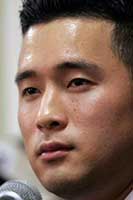
Follow workers.org on



RED HOT: TRAYVON MARTIN
CHINA,
AFGHANISTAN, FIGHTING RACISM, OCCUPY WALL STREET,
PEOPLE'S POWER, SAVE OUR POST OFFICES, WOMEN, AFRICA,
LIBYA, WISCONSIN WORKERS FIGHT BACK, SUPPORT STATE & LOCAL WORKERS,
EGYPT, NORTH AFRICA & MIDDLE EAST,
STOP FBI REPRESSION, RESIST ARIZONA RACISM, NO TO FRACKING, DEFEND PUBLIC EDUCATION, ANTI-WAR,
HEALTH CARE,
CUBA, CLIMATE CHANGE,
JOBS JOBS JOBS,
STOP FORECLOSURES, IRAN,
IRAQ, CAPITALIST CRISIS,
IMMIGRANTS, LGBT, POLITICAL PRISONERS,
KOREA,
HONDURAS, HAITI,
SOCIALISM,
GAZA



|
|
Watada trial starts Feb. 5
Army drops two charges against resister
By
John Catalinotto
Published Jan 30, 2007 10:01 PM
Lt. Ehren Watada will face two fewer charges when he is brought before a
military court-martial on Feb. 5 in Ft. Lewis, Wash. The Army dropped two of
four charges of “conduct unbecoming an officer”; as a result, it
also dropped subpoenas against two reporters, which had stirred up considerable
protest regarding freedom of the press.
Watada still faces a heavy charge of “missing movement” for his
refusal of conscience to deploy to Iraq, as well as two charges of
“conduct unbecoming” based on anti-war statements he made during
public speeches. If found guilty, he could be sentenced to four years’
confinement.
While courts-martial are stacked against defendants even more than trials in
civilian courts, the Army too has to weigh the political consequences of
dealing a harsh sentence to a popular junior officer for refusing to fight an
unpopular, ugly war.
Watada, who entered the military with patriotic motives and found himself lied
to and deceived regarding the Iraq war, has publicly argued that “to stop
an illegal and unjust war, the soldiers can choose to stop fighting it.”
The Army is trying to punish him for saying these words at a Veterans for Peace
national convention last summer—powerful words, but protected under the
Constitution.
Watada’s case has been closely supported by the growing anti-war
movement. His father, Bob Watada, spoke to the massive rally in Washington,
D.C., on Jan. 27. That same day Watada’s mother, Carolyn Ho, addressed
the protest in San Francisco. Lt. Watada himself was one of the main speakers
to over 1,000 people at the Seattle protest, where he received a prolonged
ovation.
In Seattle, Watada ended by comparing the U.S. occupation of Iraq to what it
would have been like if Britain or France had intervened in the U.S. Civil War:
“What if they killed President Abraham Lincoln, put the South in charge
of the country and changed the Constitution to benefit French and British
companies?” he said. “If we truly believe in democracy we must
listen to what the Iraqis want.” (Seattle Post-Intelligencer, Jan.
28)
Subpoenas on journalists lifted
To prosecute the case against Watada, the Army had attempted to subpoena two
reporters—independent journalist Sarah Olson of Oakland, Calif., and Greg
Kakesako of the Honolulu Star-Bulletin—and force them to testify
concerning the lieutenant’s words. Watada is from Hawaii and his parents
are well-known public figures there.
The Army decided to drop the subpoenas on Jan. 29 after a campaign to defend
the right of the media to report on cases of dissenters had begun to pick up
support from the National Press Club, the Society of Professional Journalists,
PEN American Center, Military Reporters and Editors, and many individual
writers and journalists.
In a statement, Olson said, “This should be seen as a victory for the
rights of journalists in the U.S. to gather and disseminate news free from
government intervention, and for the rights of individuals to express personal,
political opinions to journalists without fear of retribution or censure. I am
glad the growing number of dissenting voices within the military will retain
their rights to speak with reporters. But I note with concern that Lt. Watada
still faces prosecution for exercising his First Amendment rights during public
presentations.”
E-mail: [email protected]
Articles copyright 1995-2012 Workers World.
Verbatim copying and distribution of this entire article is permitted in any medium without royalty provided this notice is preserved.
Workers World, 55 W. 17 St., NY, NY 10011
Email: [email protected]
Subscribe [email protected]
Support independent news DONATE
|
|


